First Words
First Words
A Parents Step-by-Step Guide to Helping a Child with Speech and Language Delays
Barbara Levine Offenbacher
ROWMAN & LITTLEFIELD PUBLISHERS, INC.
Lanham Boulder New York Toronto Plymouth, UK
All illustrations by Kinga Domitrz
Published by Rowman & Littlefield Publishers, Inc.
A wholly owned subsidiary of The Rowman & Littlefield Publishing Group, Inc.
4501 Forbes Boulevard, Suite 200, Lanham, Maryland 20706
www.rowman.com
10 Thornbury Road, Plymouth PL6 7PP, United Kingdom
Copyright 2013 by Barbara Levine Offenbacher
All rights reserved . No part of this book may be reproduced in any form or by any electronic or mechanical means, including information storage and retrieval systems, without written permission from the publisher, except by a reviewer who may quote passages in a review.
British Library Cataloguing in Publication Information Available
Library of Congress Cataloging-in-Publication Data
Offenbacher, Barbara Levine, 1953
First words : a parents step-by-step guide to helping a child with speech and language delays / Barbara Levine Offenbacher.
p. cm.
ISBN 978-1-4422-1122-3 (cloth : alk. paper)ISBN 978-1-4422-1124-7 (electronic)
1. Speech disorders in children. 2. Language disorders in children. I. Title.
RJ496.S7O34 2013
618.92'855dc232012026710
 The paper used in this publication meets the minimum requirements of American National Standard for Information SciencesPermanence of Paper for Printed Library Materials, ANSI/NISO Z39.48-1992.
The paper used in this publication meets the minimum requirements of American National Standard for Information SciencesPermanence of Paper for Printed Library Materials, ANSI/NISO Z39.48-1992.
Printed in the United States of America
This book is dedicated
to the memory of my devoted and loving parents
Joseph and Jean Levine
Who taught me the art of communication
&
The Department of Speech and Language
Brooklyn College, City University of New York
Who taught me the science
I am not a man of words
for I am heavy of mouth and heavy of speech.
Exodus 4:10
Acknowledgments
I am forever indebted to the Speech Department at Brooklyn College, CUNY. During my undergraduate and graduate years, I had the opportunity to learn with the best and the brightest in the field. As a college freshman, it was Margaret Flynn, who inspired me to pursue this most amazing career. I had the distinct privilege of knowing and being trained by Drs. Oliver Bloodstein, Roberta Chapey, John Duffy, Gail Gurland, Irving Hochberg, and Harriet Klein, all trailblazers. In addition to the speech pathology and audiology program, I was also trained in education of the speech and hearing handicapped. I thank Esther Bogin and Beryl Adler for their wonderful teaching, and guidance. They were my instructors at the college, as well as my mentors, during my student teaching experience, in the New York City public school system. Straight out of grad school I landed my first job at PS 255, a public school in Brooklyn, New York, which housed both a mainstream and special education program. I remained in that position for eight years, under the remarkable supervision of Susan Lee Rein, the perfect Burberry/Brooks Brothers sophisticate. There is no doubt that my success as a clinician goes to Susan. Her hours of observations, her scrutiny over every detail of my therapy plans, her endless suggestions on how to make therapy more creative and effective, and her allegiance to the unprecedented, special education laws, newly passed by the U.S. Supreme Court, made her the unquestionable master clinician. Susan demanded accountability and parental involvement in therapy. Her influence and guidance, remains unyielding to this day. In addition to all this, I was extremely fortunate to be trained during a very exciting time.
The 1980s was a revolutionary period in special education, and a revolutionary time in speech and language research. New names dominated the field, Lois Bloom and Margaret Lahey, Elizabeth Wigg and Eleanor Semel with their work in language development; and Barbara Hodson and Harriet Klein with their work in phonological processing. These women reinvented the profession; they were the new pioneers. I studied from their textbooks and research. I attended workshops, seminars, and conventions where I had the opportunity to further my education and training through their groundbreaking contributions to the field. I am equally grateful to them for their outstanding impact, and how their work has made me a better clinician. Now, with the current revolution in the study of cognitive sciences, artificial intelligence, and the brain; the work of Noam Chomsky, Eric Kandel, and Steven Pinker are introducing me to the newest frontier. Their work too, continues to make me a better clinician. I am grateful to all these professionals, my timing could not have been better.
Currently, I am engaged in a full time private practice. The parents I have met and the children I have worked with have made a permanent impact on my life. Over the years I have acquired priceless friendships, and an immeasurable amount of support. I am grateful to all those parents who entrusted me with their children; I want them to know that I worked tirelessly to make a positive and lasting impact. I am also gratified by the many teachers, and school administrators who spent numerous hours via phone, meetings, and emails collaborating, in order to bridge effective therapy, with the classroom curriculum. Successful therapy requires two essential ingredients; a partnership between clinician, parent, school, and accountability. I am indebted to all those who gave so much of their time.
Writing this book is a project that began over twenty years ago. As my career moved forward, it became apparent that the time I spent in therapy with any individual child was just not enough. There were too many waking hours in the day, at risk, of being unproductive. Since every experience is an opportunity for language growth, whether walking down the aisle of a supermarket, or fishing, I knew that I needed to embrace the active participation of parents to fill this potential void. In addition, it also became apparent that valuable time was being lost as parents waited past their childs second birthday to hear a first word, and still waited, not knowing the importance of early testing and intervention. Nor did they have strategies to help stimulate their childs speech and language development, as they waited for therapy to begin. Parents needed to become empowered, and thats what this book is all about. I want to thank the publishers at Rowman and Littlefield for accepting my manuscript, and recognizing the need for this book. I also want to thank Patti Davis for her input during the early stages of the publishing process, and to Jin Yu and Laura Grzybowski for their input during the final stages. It has been a pleasure working with these most professional women. I also want to thank my book agent, Sheree Bykofsky, and her colleague Janet Rosen. Together they have answered my questions, given me sound advice, and guided me through this process. A special thanks to Sheree for all her work concerning the negotiation of the final contract. I cant imagine a better book agent exists than Sheree.
Over the years I have been blessed by wonderful colleagues. I want to thank Shaindy Guttman Cohen for the years we spent together; as well as the many undergraduate and graduate students whom I mentored. I also want to thank my friend and colleague, JoAnn Sokoloff. She taught me everything I know about creativity, and grant writing. Special thanks go to Rachelle and Ben-Gurion Matsas, founders of Image Magazine, and their sons, Steven and Michael. They have given me the opportunity to write dozens of articles, enabling me to inform countless families on issues regarding child speech and language development. Their magazine has had a significant impact on the success of my practice, and as a result, I will be forever appreciative. In addition, I am thankful to the Audiology Department at Long Island College Hospital. Over the years I have referred many children for Central Auditory Processing Testing. Their expertise has played a key role in helping to identify the presence of language learning disabilities, thus enabling appropriate diagnosis and treatment. I also want to thank Drs. Roberta Chapey PhD, and Harriet Klein PhD, noted professors in the field of speech and language; as well as Drs. Cece McCarton MD, and Eddie Gindi MD, both board certified pediatricians, in developmental and general pediatrics respectively, for taking their valuable time to review the book. I am personally honored by their support. Words cannot begin to express my genuine gratitude to Kay Domitrz. Kay and I have been a team for over ten years. Its hard to believe that when we first met Kay was searching for a career. Now, after receiving her BA and masters degree in speech and language pathology from Brooklyn College; Kay, a clinician in the New York City public school system, is working toward her bilingual certification at Columbia University. I collaborated with Kay countless times during the many drafts of this book, and could not have completed it without her. Thankfully, she has left an indelible mark by drawing the various illustrations. I have no doubt that Kay will have an amazing future. Lastly, my sincere thanks go to Dr. Michael DeMeo. My success is your success.



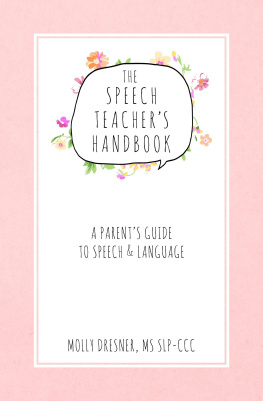
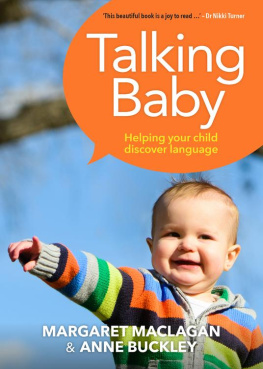

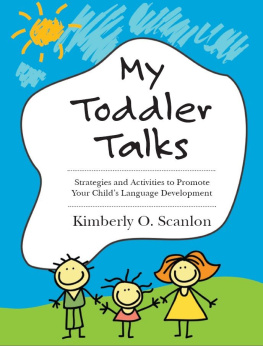
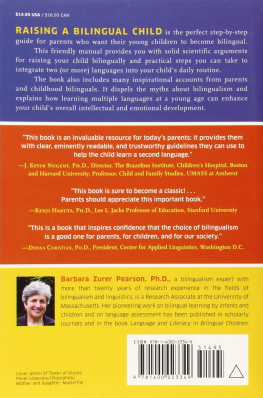

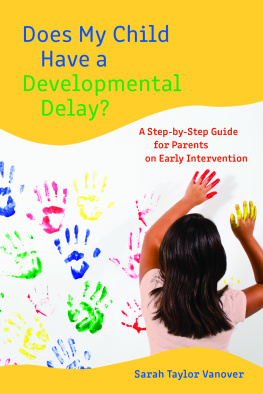
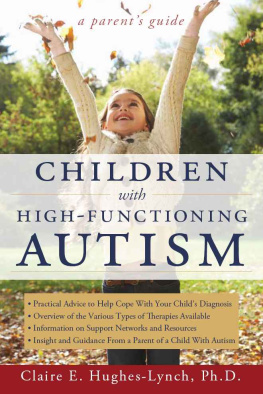
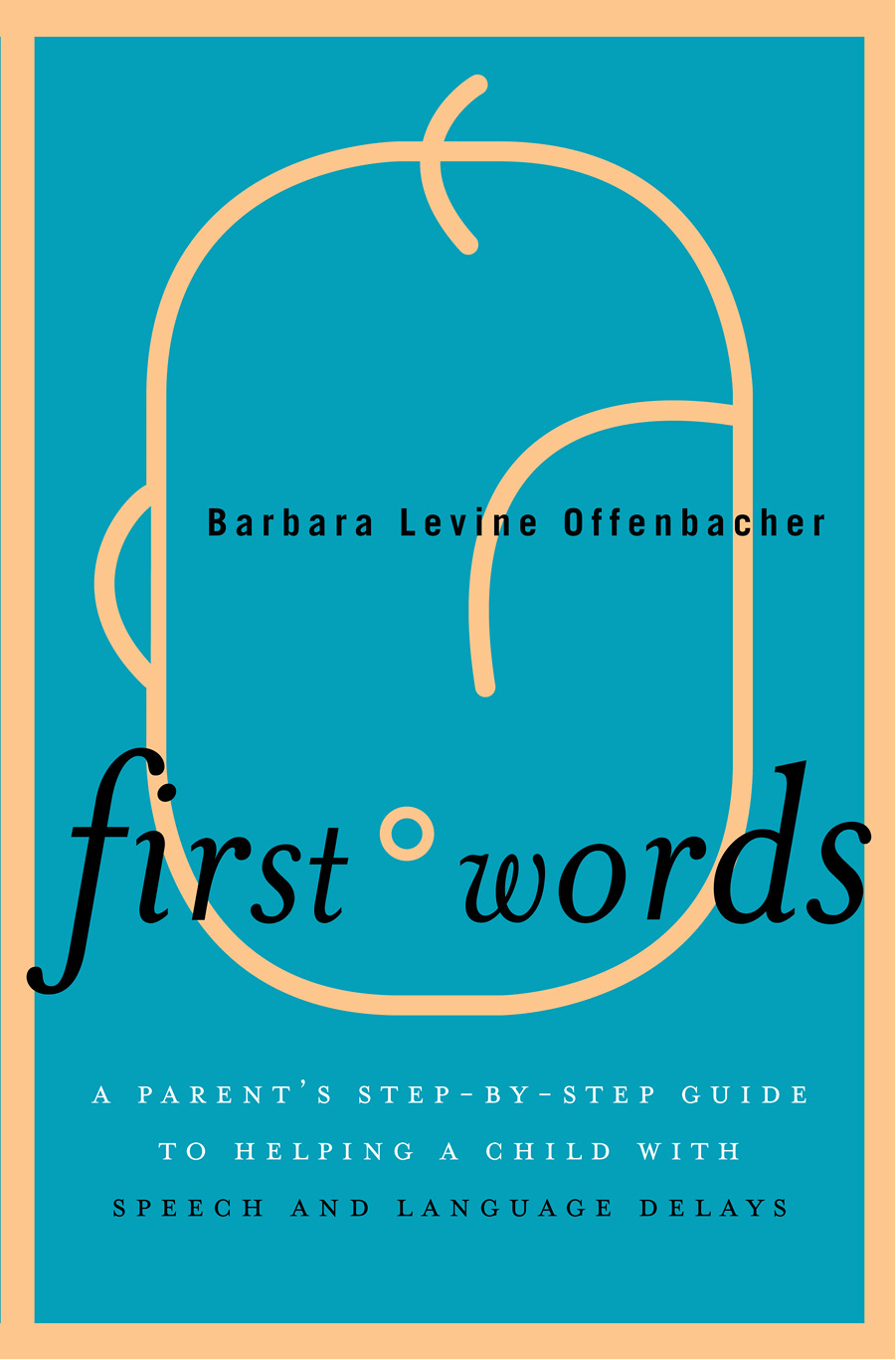
 The paper used in this publication meets the minimum requirements of American National Standard for Information SciencesPermanence of Paper for Printed Library Materials, ANSI/NISO Z39.48-1992.
The paper used in this publication meets the minimum requirements of American National Standard for Information SciencesPermanence of Paper for Printed Library Materials, ANSI/NISO Z39.48-1992.